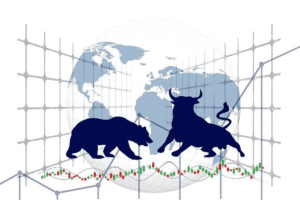Heard of the guy who got rich real quick by investing and trading in the share market ? Or the new trader who made a thousand per cent return on a penny stock ? You have probably heard such stories. Or perhaps you too started investing and trading in stocks or shares of a company. I’m here to tell you that more people(small investors/traders with total turnover of less than Rs. 10 lakhs a month) lose money in the stock/share market than make money, and try to understand why.
You might have had well meaning elders telling you that you should not invest in the share market as it is ‘jua’ or gambling. Or of people they know or knew that lost money by investing in shares. You might also have read in the papers or heard over the news that a lot of people lost money when the market crashed. Is the share market really bad ? Is it a place you should avoid completely ? Why do a majority of the small or retail investors lose money in the share/stock market ?
We can summarize the reasons for this in a few points –
- Lack of information– Small or retail traders lack sufficient information to know when and how to trade. They may refer to stock market tips to trade or follow tips that promise quick returns. Often, these tips are not from an authentic source and can lead to the investors/traders making losses. Contrast this with institutional traders like banks and mutual funds who have a fund manager and an entire team of research analysts who study the companies in detail before investing, and it becomes very clear that the small or retail trader is at a disadvantage in access to relevant information when it comes to trading in shares/stocks.
- Trading in F&Os – F&O or Future and Options trading is engaged in by small or retail investors in hopes of making quick profits. However, reports say that a very large majority of F&O traders lose money. Despite losing money, the traders stay on in hopes of recovering the losses and making profits in future by continuing to trade in F&Os.
- Margin Trading – In margin trading, an investor/trader can trade with more money that he or she has in their account by taking a sort of loan based on their current stock/share holdings. This is a very attractive facility to retail traders/investors as it lets them invest for a value greater than the actual money they have. The drawback is that, in the event of a market correction(when the share market falls, it’s called a ‘correction’), the value of the margins also come down, so, when you do not have sufficient share value to support the margin or loan amount, the brokerage will sell existing shares/stocks to compensate the shortfall, thereby increasing your losses.


- FOMO – FOMO or Fear Of Missing Out is when investors/traders purchase a stock after the price has gone up in the fear of missing out on potential gains when the share price continues to rise. This causes traders/investors to invest additional money in a share whose price has gone up and is going up without doing their due research. What can happen is that the traders/investors will lose their money if there is a reversal in the price movement in that particular stock. The FOMO mentality is often exploited by share price manipulators to raise the price of certain stocks and then selling and exiting with huge profits and leaving the small/retail traders who purchased those shares in huge loss.
- Herd mentality – Herd mentality in share trading is when people buy or sell shares of a particular company because others(‘everyone else’) is doing it. This is a common behaviour in many fields including the share/stock market. This can lead to the price of a share going up or down exponentially without a change in the company’s business fundamentals. This an be used by stock market manipulators to manipulate the markets, leading to strategies like pump and dump and others to profit illegally from share trading. While the manipulators make money, often very large sums, the common or retail investor is left with huge losses.


- Trying to time the market– Many retail traders/investors try to time the market, that is, try to purchase a stock/share when the market or the share price is low, and sell it when the market or the price is high. Studies have shown that it is not possible to do this consistently. A lot of retail/small investors still try to do this because the potential returns are very attractive. And they end up losing money.
- Greed and fear – Greed and fear are the two emotions that drive almost anything in life, including the share market. The market goes up when investors are greedy and goes down when they are fearful. These up and down movements are not based on the fundamentals of the individual stocks or the market environment. When the market is in a bull run(share prices going up) investors/traders are greedy for more returns and so they keep purchasing shares, even when the price goes well above what is justified by the fundamentals. It is due to this behaviour that during bull runs many shares of companies, especially small companies(micro caps) go up very fast and by a lot without a corresponding change in it’s business fundamentals.
Similarly, when the market is in a bear run(when share prices are going down), many company shares trade at very low prices, because traders/investors are fearful that the market will correct(when the share market goes down, it is said to be ‘correcting’, so when the share market falls, it is said to have ‘corrected’) further, so the share holders keep selling their shares, which leads to the share prices going down further.
How can small or retail traders improve their chances of making profits in the share/stock market
Now the question arises that if investing/trading in shares leads to making losses more often than profits, should small/retail traders stay away from the share/stock market ? Is the potential for profits of the share markets only for large or institutional investors ? Fortunately, retail or small traders can also improve their chances of making profits in the share market. A few strategies for that can be:
- Investing through mutual funds: A mutual fund is a vehicle wherein people pool their investments and the investments are managed by a professional fund manager. This fund manager has a team of researchers to assist him or her. The investment is made in a number of companies, so the risk of loss is further reduced, that is, even if one company were to fail, the loss would be limited to the percentage of the capital invested in that particular company. Also, if any one or a few of the companies do very well, you will have a share of the appreciation(rise in share price) as the fund pwns part of the company or companies.
- Educating themselves– The retail investors/traders can increase their knowledge of the markets or individual shares by learning more about them. There are courses run by the NSE or National Stock Exchange of India Ltd and other institutions that teach how to trade in the share market. Training is also provided by many of the share brokerage houses. When retail investors or small traders make use of these training sessions to learn more about share investing/trading, their chances of making profits from share/stock investing or trading go up.
- Investing for the long term – When you invest for a longer duration, the chances of profits go up and the risk of loss goes down the longer you invest for. This is because there may be fluctuations in share prices in the short term based on market factors or specific events. However, in the long term, markets move in a certain direction, based on the stage of development of the country’s economy. In India, the markets will go up over the long term as India I still a developing country and has a growing middle class that will spur demand for added products and services. India also has a favourable demographic profile for economic growth, that is, India has a large pool of young population who will be entering their productive ages in the near future, thereby driving consumption. Thus, though there may be fluctuations in the market in the short term, we will see growth in the economy reflecting in the performance of the share market over the long term.


Conclusion
The average small or retail trader does not profit from trading in the share market due to factors like trading with insufficient knowledge, purchasing a rising stock due to fear of missing out or trading out of greed and fear. Small/retail traders can increase their chances of making profits by strategies like educating themselves, investing for the long term and investing through mutual funds. Happy investing !









